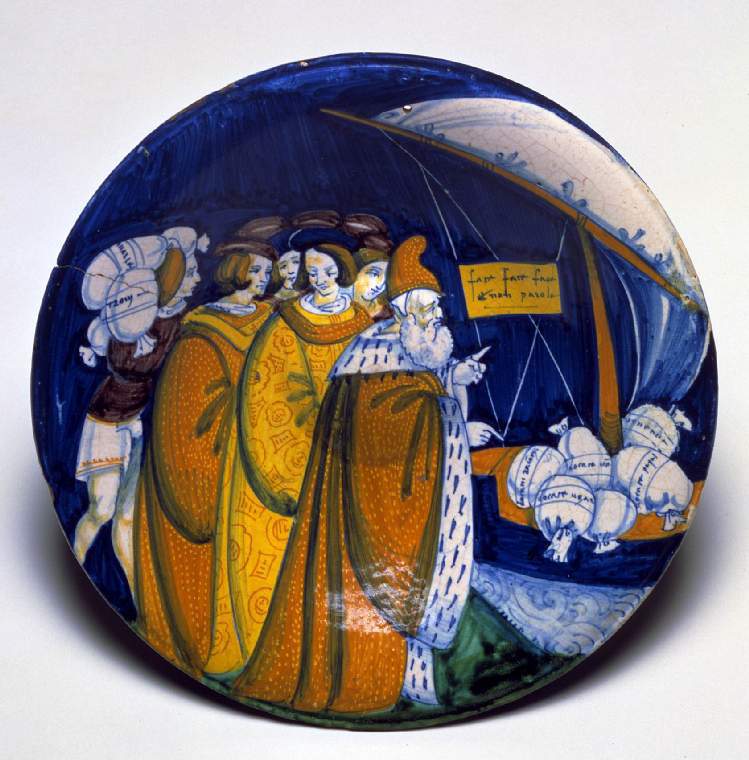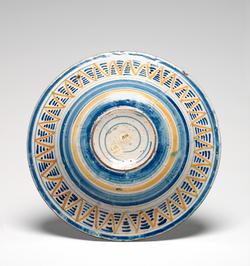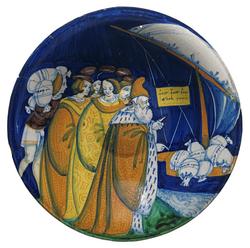Current Location: Gallery 6 (Upper Marlay): case 3, shelf B
Titles
Doge Agostino Barbarigo supervising the loading of Money into a Ship destined for the Relief of Naples
Maker(s)
Maker:
Unknown
(Uncertain)
Entities
Categories
Description
Tin-glazed erthenware painted in polychrome with Doge Agostino Barbarigo supervising the loading of Money into a Ship destined for the Relief of Naples.
Reddish earthenware, tin-glazed overall. Painted in dark blue, green, yellow, orange, and manganese-purple. Shape 66. Circular with shallow curved sides, slightly everted at the rim.
Doge Agostino Barbarigo supervising the loading of Money into a Ship destined for the Relief of Naples. The ship is moored beside a wharf on the right. At the foot of the mast there are six money bags, five of which bear a label inscribed with the name of the coins they contain: `docate papal' (papal ducats), `docate ugar' (Hungarian ducats), `docatti ancon' (Ancona ducats), `docate ve' (Venetian ducats), and `venetia' (Venetian ?). A rectangular notice suspended from the rigging is inscribed `fatte fatte fatte/et non parole' (deeds, deeds, deeds and not words). The Doge stands in the middle, pointing to the label with his left hand and to the money with his right. Four togati stand behind him and, on the extreme left, a sailor approaches carrying four more bags, two of which are labelled `March' (small silver marchesane or marcelli) and `Troni' (silver lira introduced by Doge Niccolò Tron). The foreground is green and the background dark blue with pronounced vertical brush strokes. The back is decorated with a central blue spiral surrounded by concentric circles: wide blue, orange and blue, two narrow blue, and a yellow zig-zag border filled with transverse blue lines. The edge is encircled by a blue band.
Notes
History note: Purchased before 1922 from Stora, Paris, probably Maurice Stora (1879-1950), Boulevard Hausmann, Paris, by F. Leverton Harris.
Legal notes
F. Leverton Harris Bequest
Measurements and weight
Diameter: 28 cm
Height: 4 cm
Acquisition and important dates
Method of acquisition: Bequeathed
(1926)
by
Harris, Frederick Leverton
Dating
15th Century, Late
16th Century, Early
Renaissance
Circa
1495
CE
-
1520
CE
Note
This is a rare portrayal on maiolica of a recent historical event. The French had invaded Naples in February 1495 and the ousted Aragonese King, Ferdinand II, appealed to Venice for help. By the end of March, an anti-French treaty known as The Holy League had been concluded. The League was made public on Palm Sunday, 1495 and afterwards money was collected and despatched by sea to Ferdinand II. The sacks on the ship are labelled with their contents: Papal, Hungarian, Ancona, and Venetian ducats. The two carried by the sailor on the left are labelled `March', probably small silver marchesane or marcelli, and `Troni', silver lire introduced by Doge Niccolò Tron (1471-4). The notice on the ship's rigging, `fate fate fatte/et non parole' (action, action, action and not words), indicates that Venice was sending practical assistance and not just vain promises.
The attribution of the dish has caused much speculation. The subject is so specifically Venetian that it is only natural to consider that it was painted there soon after the event. However, no firm evidence for the manufacture of maiolica in Venice in 1495 has been published, and istoriato dishes from any centre before 1500 are uncommon. In view of the dish's shape, certain aspects of the figures, and the decoration of the reverse, it is more likely to have been made in Faenza between about 1500 and 1520. If made in Venice or elsewhere it was probably decorated by a painter trained in Faenza.
School or Style
Renaissance
People, subjects and objects depicted
Components of the work
Decoration
composed of
high-temperature colours
( in dark blue, green, yellow, orange, and manganese-purple)
Materials used in production
Tin-glaze
Earthenware
Techniques used in production
Throwing
: Reddish earthenware, tin-glazed overall. Painted in dark blue, green, yellow, orange, and manganese-purple.
Tin-glazing
Inscription or legends present
- Text: `docate papal' (papal ducats), `docate ugar' (Hungarian ducats), `docatti ancon' (Ancona ducats), `docate ve' (Venetian ducats), and `venetia' (Venetian ?)
- Location: On the front, on the money bags at the foot of the mast
- Method of creation: Inscribed
- Text: fatte fatte fatte/et non parole
- Location: On the front, on a rectangular notice suspended from the rig
- Method of creation: Inscribed
- Text: `March' (small silver marchesane or marcelli) and `Troni' (silver lira introduced by Doge Niccolò Tron)
- Location: On the front, on two of money bags carried by the sailor
- Method of creation: Inscribed
References and bibliographic entries
Related exhibitions
Identification numbers
Accession number: C.62-1927
Primary reference Number: 80774
Stable URI
Audit data
Created: Saturday 6 August 2011
Updated: Monday 25 March 2024
Last processed: Wednesday 14 May 2025
Associated departments & institutions
Owner or interested party:
The Fitzwilliam Museum
Associated department:
Applied Arts

 IIIF Manifest
IIIF Manifest






